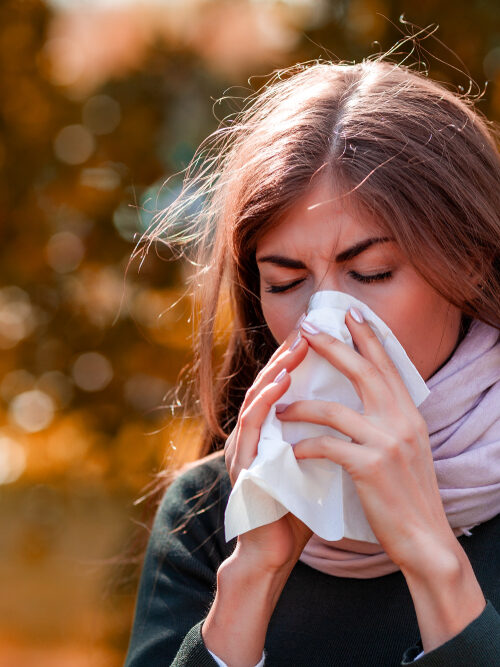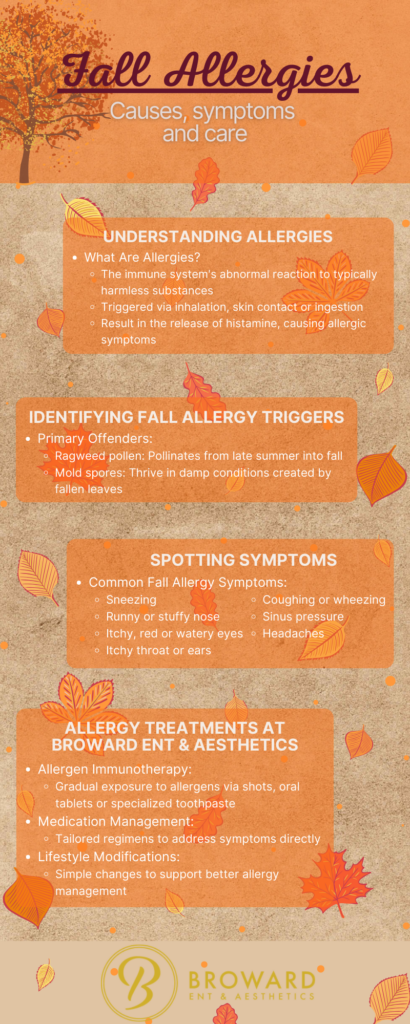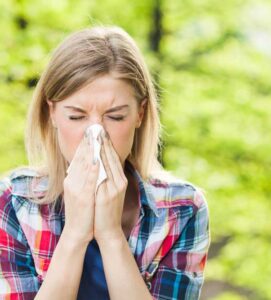
As the warm embrace of summer gradually gives way to the crisp, cool air of autumn, many anticipate the season of vibrant foliage, pumpkin-spiced treats and cozy sweaters. Yet, for allergy sufferers, fall is synonymous with the resurgence of uncomfortable, often debilitating symptoms. The transition into the cooler months can trigger a flurry of allergies, making it a period of dread rather than delight.
Fortunately, expert care is within reach to help mitigate your symptoms and restore your comfort. Broward ENT & Aesthetics stands ready to offer personalized, effective treatment strategies to tackle your allergies.
If you’d like to learn about the common causes of fall allergies, the symptoms to look out for, and how professional care can help alleviate your allergy suffering, this article is for you.
What Are Allergies?
Before we dive into the triggers and ways to find relief from allergies, let’s take a minute to understand what allergies are. Allergies are a reaction by your immune system to substances that are not usually harmful. When you come into contact with an allergen — whether through inhalation, skin contact or ingestion — your immune system reacts abnormally, treating the substance as a threat and responding to it. This response triggers the release of chemicals like histamine, which in turn cause allergic symptoms. Although histamines are part of your body’s defense strategy, their action can sometimes go overboard, leading to discomfort and irritation.
The Underlying Culprits: What Sparks Fall Allergies?
The prime perpetrator of fall allergies is ragweed pollen. This common allergen begins to pollinate in late summer and continues well into the fall, casting a vast amount of tiny pollen grains into the air. Even if this pesky plant doesn’t grow in your vicinity, the wind can carry ragweed pollen for hundreds of miles, infiltrating almost every state in the U.S. If you’re sensitive to this pollen, your immune system can have a strong reaction, triggering your allergy symptoms.
Mold is another significant allergen in autumn. As leaves fall and create a damp layer on the ground, they provide a fertile breeding ground for mold spores. When these spores take to the air, they can ignite a host of allergic reactions.
Detecting the Signal: Recognizing Fall Allergy Symptoms
While many are aware of spring as allergy season, if you’re experiencing similar symptoms throughout the fall that recur annually, you likely have fall allergies. Knowing what symptoms to look for is the first step toward reclaiming your well-being.
Common manifestations of fall allergies include:
- Sneezing
- Runny or stuffy nose
- Itchy, red or watery eyes
- Itchy throat or ears
- Coughing or wheezing
- Sinus pressure
- Headaches
The symptoms you experience during an allergy flare-up are actually your body’s way of fending off allergens. When you sneeze, it’s a mechanism to clear allergens out of your nasal passages. Similarly, a runny nose and watery eyes work to wash away these irritants. The itchiness in your eyes and the congestion you feel are brought on by a surge in histamine, which causes inflammation and ups the mucus production to trap and expel allergens from your system.
How Do I Know I Have Allergies, a Cold or Covid?
The overlap between allergy symptoms and those of colds or other respiratory infections can sometimes lead to confusion. However, there are some ways to differentiate between them and determine whether you’re safe to be around others or at risk of spreading a contagious sickness.
The most surefire way to find out if you have allergies or a viral infection is to get tested. However, there are some indicators that can point toward the root of your symptoms without testing. Viral infections typically emergy abruptly and have a limited duration, while allergies often linger for several weeks. Unlike colds, Covid or the flu, allergies don’t often bring about fevers, body aches or gastrointestinal issues like diarrhea. Itchiness is a hallmark sign of allergies, so take note of any scratchy or tingling feelings in your ears, eyes, throat and nose. Additionally, fall allergens might trigger skin conditions such as eczema.

The Path to Relief: Addressing Your Fall Allergies
Acknowledging your symptoms and understanding their cause is crucial, but seeking professional assistance for a definitive diagnosis and personalized care plan is the next vital step. Dr. Wilson DuMornay at Broward ENT & Aesthetics delivers a well-rounded approach to tackling allergies, melding modern diagnostic methods with tailored treatment plans for optimal care and enduring allergy relief.
Identifying Allergies: Skin and Blood Tests
Allergy testing is needed to diagnose your allergies and pinpoint the exact triggers. We test for allergies using skin tests or blood work. Skin tests involve patch tests for contact allergens and prick tests for airborne ones. Alternatively, blood tests gauge allergy-related antibodies in your bloodstream.
With this valuable insight, a treatment plan is developed to help alleviate your symptoms and improve your quality of life.
Allergy Treatments Offered at Broward ENT & Aesthetics
Our strategies range from prescription medications and lifestyle adjustments to immunotherapy, offering a comprehensive approach to managing your fall allergies.
Allergen Immunotherapy
Allergen immunotherapy at our Fort Lauderdale office involves gradual allergen exposure to allergens to boost your tolerance, potentially reducing or eradicating symptoms. The exposure can be administered via shots, oral tablets or toothpaste.
Allergy Shots
Allergy shots for immunotherapy begin with a build-up phase of frequent injections, followed by a maintenance phase with less frequent, steady-dose injections.
Oral Allergy Tablets
A substitute for shots, these under-the-tongue (sublingual) tablets can be self-administered, targeting specific allergies like ragweed pollen, grass pollen or dust mites.
Allergy Toothpaste
Dr. DuMornay offers this novel treatment where a specialized toothpaste delivers small allergen doses as you brush, making allergy management convenient.
Medication Management
Tailored medication regimens, encompassing antihistamines, decongestants and more, can address your symptoms directly.
Practical Lifestyle Modifications
Simple changes like keeping windows shut on high-pollen days, staying indoors during peak pollen hours if possible, and using air purifiers can be part of your personalized strategy to manage allergies better. Dr. DuMornay may also recommend saline rinsing to help clear your nasal passages of irritants, and he provides guidance on the correct usage of neti pots or similar devices for this purpose.
Take Control of Your Allergies and Discover Lasting Relief
Don’t let fall allergies hold you captive in a cycle of discomfort. The knowledge and experience housed at Broward ENT & Aesthetics in Fort Lauderdale can give you relief from seasonal allergies, allowing you to fully embrace the beauty of autumn. Let this be the season you break free from the grip of allergies and rediscover the joys that fall has to offer.
Your pathway to relief is just a consultation away at Broward ENT & Aesthetics. Schedule your appointment with Dr. DuMornay today!





